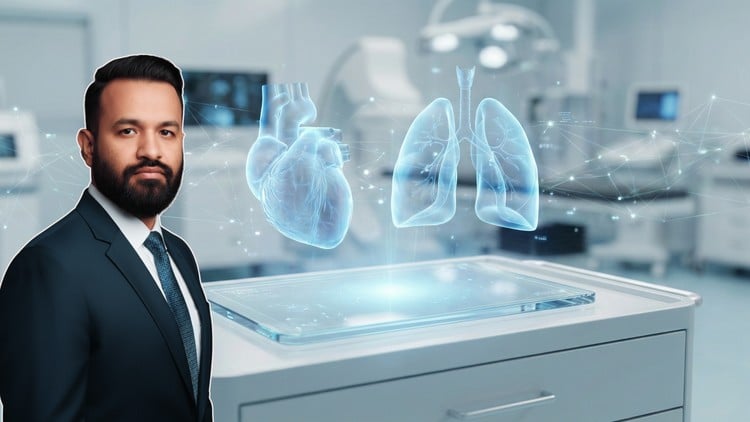
Learn how AI is transforming diagnostics, drug discovery, and surgery, and explore its ethics, challenges, and future
⏱️ Length: 2.6 total hours
👥 26 students
Add-On Information:
Note➛ Make sure your 𝐔𝐝𝐞𝐦𝐲 cart has only this course you're going to enroll it now, Remove all other courses from the 𝐔𝐝𝐞𝐦𝐲 cart before Enrolling!
-
Course Overview
- Explore the overarching societal and clinical impact of Artificial Intelligence, moving beyond mere technical definitions to understand its transformative potential across the entire healthcare ecosystem.
- Gain critical insight into the evolving legal and regulatory frameworks that govern the development, deployment, and ethical use of AI technologies within diverse healthcare settings globally.
- Understand how AI is catalyzing a fundamental shift in healthcare delivery, transitioning from reactive treatment models to more proactive, predictive, and personalized patient care strategies.
- Discover the paramount importance of data privacy, security protocols, and robust governance in ensuring the responsible and trustworthy implementation of AI solutions that handle sensitive health information.
- Unpack the critical necessity of fostering seamless human-AI collaboration, recognizing that the most optimal patient outcomes are often achieved through synergistic integration rather than full automation.
- Investigate the global adoption trends, market drivers, and unique challenges faced by various healthcare systems in successfully integrating and scaling AI innovations, from developed nations to emerging economies.
- Familiarize yourself with the growing imperative for explainable AI (XAI) within high-stakes medical decision-making contexts, where transparency and interpretability are crucial for trust and accountability.
- Grasp the multidisciplinary nature of AI in healthcare, highlighting the convergence of computer science, clinical practice, public health, ethics, and policy required for successful innovation.
-
Requirements / Prerequisites
- A keen and inquisitive interest in the dynamic intersection of advanced technology and healthcare innovation is the primary prerequisite for this course.
- While not strictly mandatory, a foundational understanding of basic biological concepts or common medical terminology may enhance comprehension, though all necessary context will be provided.
- No prior programming experience, advanced mathematical knowledge, or specialized technical background in AI is required; the course is designed to be accessible to a broad audience.
- An open and critical mind for exploring complex ethical dilemmas, societal implications, and the future possibilities that AI presents within the constantly evolving healthcare landscape.
-
Skills Covered / Tools Used
- Develop a discerning critical lens for evaluating the efficacy, validity, and potential biases of AI solutions when applied within real-world clinical and operational healthcare settings.
- Cultivate a foundational understanding of data governance principles, emphasizing responsible data collection, storage, sharing, and usage, which are absolutely essential for ethical healthcare AI.
- Learn to effectively articulate the potential benefits, inherent limitations, and associated risks of AI technologies to diverse non-technical stakeholders, including patients, clinicians, and administrators.
- Acquire practical literacy in key terminologies, concepts, and methodological approaches commonly utilized in contemporary AI healthcare discourse, enabling informed participation.
- Gain conceptual awareness of various leading AI platforms, frameworks, and specialized toolkits through their application domains, such as those used for medical imaging analysis or bioinformatics research.
- Formulate well-reasoned and informed opinions on the responsible development, transparent deployment, and ongoing monitoring of AI technologies to ensure patient safety and equitable access.
- Understand the conceptual lifecycle of an AI project within healthcare, from initial problem identification and data acquisition through to model development, validation, and ethical integration.
- Enhance your ability to identify appropriate scenarios where AI can offer significant value, distinguishing them from situations where traditional methods remain more suitable or ethical.
-
Benefits / Outcomes
- Become a more informed, articulate, and confident participant in crucial conversations surrounding healthcare’s technological future, both within professional and public spheres.
- Position yourself strategically to identify emergent opportunities for AI integration, process optimization, and innovative solution development within your current or prospective professional domain.
- Enhance your capability to critically assess the credibility, evidence base, and inherent limitations of AI-driven medical claims, fostering a more skeptical and analytical approach.
- Contribute thoughtfully and constructively to vital discussions on patient data privacy, algorithmic bias, fairness, and the ethical responsibilities inherent in AI system design and implementation.
- Prepare yourself for evolving roles and career pathways that demand a nuanced understanding of emerging health technologies and their profound implications for patient care and public health.
- Develop a robust foundational perspective that can serve as a springboard for further specialized learning or advanced studies in health informatics, medical AI, or digital health innovation.
- Empower yourself to advocate effectively for ethical AI practices, transparent algorithms, and patient-centered technology deployment within healthcare organizations and policy-making bodies.
- Gain clarity on the diverse professional pathways and interdisciplinary collaboration opportunities that are rapidly emerging as AI increasingly reshapes the landscape of modern medicine.
-
PROS
- Concise yet comprehensive: Delivers a broad and accessible understanding of a complex, multifaceted field within a highly time-efficient 2.6-hour duration.
- Ethics-centric focus: Places a strong and necessary emphasis on responsible AI development, deployment, and governance, which is critically important in the healthcare sector.
- Future-focused relevance: Equips learners with foundational knowledge and perspectives that are essential for understanding and navigating the rapidly evolving landscape of medical technology.
- Highly accessible: Thoughtfully designed to be understood and beneficial for individuals across diverse professional and educational backgrounds, not exclusively technical experts.
-
CONS
- High-level overview: Due to its concise nature and duration, the course necessarily provides a conceptual, high-level overview, limiting deep dives into advanced technical implementations or hands-on practical application.
Learning Tracks: English,Development,Data Science
Found It Free? Share It Fast!